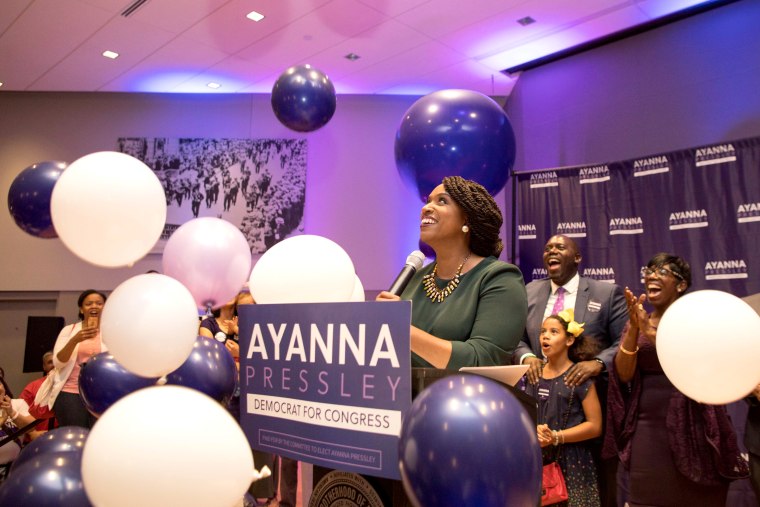For as long as I’ve called Boston home, conventional wisdom has been that it’s a “white city.”
That’s not because of the statistics, mind you — people of color make up almost half of the city’s population — but because Boston’s leadership class has been mostly Caucasian for a very long time. Most of our elected officials hail from a uniquely privileged group of (mostly) white, (mostly) wealthy and (mostly) male demographic that is overrepresented in American politics.
The city of Boston has never sent a representative of color to Washington D.C. This means that Boston communities with large minority populations such as Dorchester, Roxbury and Jamaica Plain have spent the past few decades with a Congressional representative who looked nothing like them and cared more about the party line then voter concerns.
Boston communities with large minority populations have spent the past few decades with a Congressional representative who looked nothing like them.
That finally changed on Sept. 4. After a passionate primary race that garnered attention from national media outlets, Boston City Council member Ayanna Pressley — the first woman of color ever elected to the council — defeated incumbent Rep. Mike Capuano on Tuesday night. Both of them ran as progressive candidates, but Pressley took bolder positions on immigration reform and the role of corporate money in politics. Given the district’s heavily Democratic voters, it’s almost assured that Pressley will be setting up shop in the U.S. House of Representatives next year.
In the Massachusetts State House, Nika Elugardo — literally my neighbor here in Jamaica Plain — took down Democratic Rep. Jeff Sanchez in another startling upset. Sanchez headed the Ways and Means Committee and had come under fire for doing the bidding of neoliberal House Speaker Bob DeLeo at the expense of taking progressive stands on issues such as the ongoing ICE raids on immigrant communities and fossil fuel pollution. (Both of those issues can have grave consequences for communities like Jamaica Plain.)
The race for Suffolk District Attorney was arguably the night’s biggest upset, even though it happened at the local level. Rachael Rollins, a former prosecutor and a criminal justice reform candidate, handily won the election by a comfortable margin. This was a stunning result for two reasons. First, Boston’s law enforcement community has a very ugly history of racism. The police force here is overwhelmingly white, and elected officials like District Attorney Dan Conley have routinely carried water for white officers involved in racially charged incidents. Second, Rollins was outspent and out-fundraised by Greg Henning — a Conley protege who took in donations from police organizations and was widely considered to be the favorite.
Women of color running progressive grassroots campaigns are causing political earthquakes in regions that have waited decades for change and representation.
But by midnight, Henning had phoned Rollins to concede, and a raucous Jamaica Plain victory party for Rollins was well underway at Canary Square — a brewpub within 10 minutes walking distance of the Rollins campaign headquarters and, coincidentally, my apartment. Indeed, for the last six months the efforts of grassroots organizers have spread throughout my community, with lawn signs and canvassers an increasingly common sight.
This movement isn’t simply happening in Massachusetts, though. What I’ve witnessed in my hometown is reflective of a growing evolution in U.S. politics. Women of color running progressive grassroots campaigns are causing political earthquakes in regions that have waited decades for change and representation. Indeed, Tuesday’s results were preceded by the victory of Stacey Abrams in Georgia, Rashida Tlaib in Michigan and of course, by Alexandria Ocasio-Cortez, who blew Rep. Joe Crowley off his congressional perch back in June.
And we can expect more electoral upsets as we head into the 2018 midterms and then look forward towards 2020 — when the national referendum on Donald Trump’s presidency takes place.
So besides the polarizing effect of Trump, why is this happening now? Changing demographic ratios are a piece of the answer. America is becoming less white, and with that shift comes a realignment of political power. But it’s not that simple. These candidates and their campaigns offer a sense of possibility to prospective voters — particularly those who have been marginalized by America’s socioeconomic inequities.
When a candidate like Ayanna Pressley makes it all the way to Washington, the promise of representation brings with it the hope that a better alternative to the broken status quo is possible. This is especially pertinent on issues like criminal justice reform. The prospect of Rachael Rollins leading an office long held by white men invites one to imagine a city where racial profiling and mass incarceration doesn’t destroy the lives of thousands of young men and families of color.
In a city like Boston, that’s nothing less than revolutionary. But if women like Rachael Rollins, Ayanna Pressley and Nika Elugardo can win here, in a city as racially stratified and old-fashioned as Boston, maybe they really can win anywhere.
CORRECTION (Sept. 7, 2018, 11:15 a.m. ET): An earlier version of this article misspelled the last name of a Boston City Council member running for a seat in the House of Representatives. She is Ayanna Pressley, not Presley.
